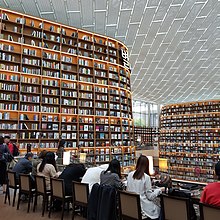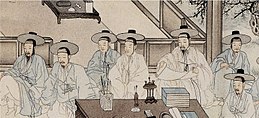
South Korea was the host nation and competed as Korea at the 1988 Summer Olympics in Seoul. 401 competitors, 269 men and 132 women, took part in 218 events in 27 sports.

South Korea competed as Korea at the 1992 Summer Olympics in Barcelona, Spain. 226 competitors, 154 men and 72 women, took part in 134 events in 24 sports.

South Korea competed as Korea at the 2000 Summer Olympics in Sydney, Australia. Athletes from North and South Korea marched together in the opening ceremony under the Korean Unification Flag. 281 competitors, 175 men and 106 women, took part in 144 events in 26 sports.
Seoul Institute of the Arts is a prominent educational institution specializing in the Arts located in Ansan, Gyeonggi Province, South Korea. The school has nurtured many graduates who are actively working in art related fields within Korea as well as internationally. The Namsan campus in the heart of Seoul is used for presentation of arts productions and convergence with industry. The Ansan Campus opened in 2001 and is used for educational training, which aims to tear down barriers between disciplines, genres, and majors. The Institute continues to be a forerunner in globalization of Korean arts and creation of new forms of arts.

Empress Myeongseong is a 2001 and 2002 South Korean television series that aired on KBS2.

The South Korea women's national volleyball team represents South Korea in international volleyball competitions and friendly matches. It was one of the leading squads in the world in the 1970s, 1990s and 2010s, having won the bronze medal at the 1976 Summer Olympics in Montreal, Quebec, Canada, and placing fourth at the 1972 Summer Olympics in Munich, Germany, the 2012 Summer Olympics in London, Great Britain and the 2020 Summer Olympics in Tokyo, Japan.

The South Korea men's national volleyball team represents South Korea in international volleyball competitions and friendly matches, governed by Korea Volleyball Association. The Republic of Korea (ROK) has competed in the Olympic Games eight times, but has not featured since the 2000 Olympic Games in Sydney, Australia. The national team's best performance at the Olympic Games was 5th place at the 1984 Games in Los Angeles, California, United States. The national team at the FIVB World Championship competed nine times, with their best result at 4th place in 1978. On continental level, The national team won three gold medals at the Asian Games in 1978, 2002 and 2006. And at the Asian Championship, the national team won four gold medals, two of these was at home in 1989 Seoul and 2001 Changwon and the other two are in 1993 and 2003. The national team now ranks 30th in the FIVB World Rankings and their current head coach is Im Do-heon.
The National Academy of Sciences of the Republic of Korea (Korean: 대한민국학술원), is the senior national organization of distinguished Korean scientists and scholars. It was founded to promote learning and research in all areas of sciences by conferring membership and preferential treatment to those who have made outstanding contributions to the advancement of sciences and learning. The Academy consists of 150 Fellows who are selected by their peers for their contributions to the sciences and education.

South Korea participated in the 2006 Asian Games in Doha, Qatar on 1–15 December 2006. South Korea ranked 2nd with 58 gold medals in this edition of the Asiad.
The Yi Sang Literary Award (이상문학상) is a South Korean literary award. It is one of South Korea's most prestigious literary awards, named after Yi Sang, an innovative writer in modern Korean literature. The Yi Sang Literary Award was established in 1977. It is sponsored by the Korean publisher Munhaksasangsa and has become one of the most prestigious literary awards in South Korea.
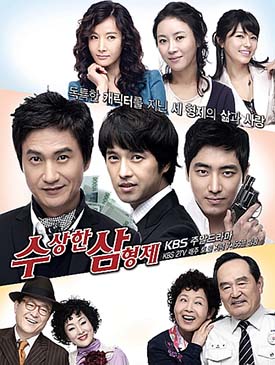
Three Brothers is a 2009 South Korean television series starring Ahn Nae-sang, Oh Dae-gyu, Lee Joon-hyuk, Park In-hwan, Do Ji-won, Kim Hee-jung and Oh Ji-eun. It aired on KBS2 from October 17, 2009, to June 13, 2010, on Saturdays and Sundays at 19:55 for 70 episodes.

Life Is Beautiful is a 2010 South Korean television series starring Song Chang-eui, Lee Sang-woo, Lee Sang-yoon and Nam Sang-mi. It aired on SBS TV from March 20 to November 7, 2010 on Saturdays and Sundays at 21:45 for 63 episodes.

Flowers of the Prison is a 2016 South Korean drama television series starring Jin Se-yeon, Go Soo, Kim Mi-sook, Jung Joon-ho, Park Joo-mi, Yoon Joo-hee, Kim Soo-yeon, Jun Kwang-ryul and Choi Tae-joon. It is MBC's special project drama to commemorate the network's 55th-founding anniversary. The drama also marks the 3rd time collaboration between director Lee Byung-hoon and writer Choi Wan-kyu, after Hur Jun and Sangdo. It replaced Marriage Contract and aired on MBC every Saturdays and Sundays at 22:00 (KST) for 51 episodes from April 30 to November 6, 2016.
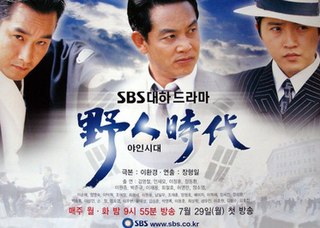
Rustic Period (Korean: 야인시대) is a South Korean television series aired from July 29, 2002, to September 30, 2003, on SBS. It focused on the life of historical figure Kim Du-han, a former mob leader turned politician, and the tumultuous modern history of Korea from the Japanese occupation to Park Chung-hee regime.
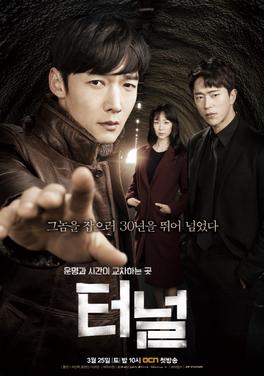
Tunnel is a 2017 South Korean television series starring Choi Jin-hyuk, Yoon Hyun-min and Lee Yoo-young. It replaced Voice and aired on cable network OCN on Saturdays and Sundays in the 22:00 (KST) from March 25 to May 21, 2017 for 16 episodes. The series was inspired by the Hwaseong serial murders.
